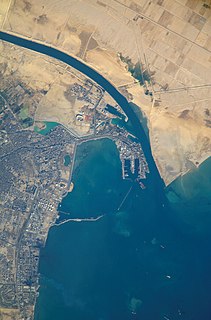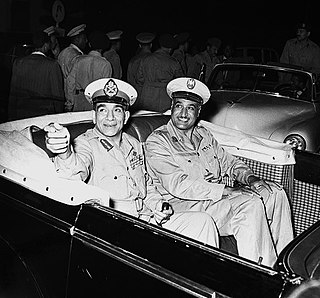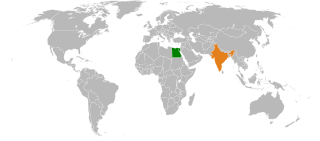Related Research Articles

Transport in Egypt is centered in Cairo and largely follows the pattern of settlement along the Nile. The Ministry of Transportation and other government bodies are responsible for transportation in Egypt, whether by sea, land or air.

Gamal Abdel Nasser Hussein was an Egyptian politician who served as the second President of Egypt, from 1954 until his death in 1970. Nasser led the 1952 overthrow of the monarchy and introduced far-reaching land reforms the following year. Following a 1954 attempt on his life by a Muslim Brotherhood member, he cracked down on the organization, put President Mohamed Naguib under house arrest and assumed executive office. He was formally elected president in June 1956.

The Suez Crisis, or the Second Arab–Israeli war, also called the tripartite aggression in the Arab world and Sinai War in Israel, was an invasion of Egypt in late 1956 by Israel, followed by the United Kingdom and France. The aims were to regain Western control of the Suez Canal and to remove Egyptian president Gamal Abdel Nasser, who had just nationalised the canal. After the fighting had started, political pressure from the United States, the Soviet Union and the United Nations led to a withdrawal by the three invaders. The episode humiliated the United Kingdom and France and strengthened Nasser.

Suez is a seaport city in north-eastern Egypt, located on the north coast of the Gulf of Suez, near the southern terminus of the Suez Canal, having the same boundaries as Suez Governorate. It has three harbours, Adabiya, Ain Sokhna and Port Tawfiq, and extensive port facilities. Together they form a metropolitan area.

According to most scholars the history of modern Egypt dates from the start of Muhammad Ali's rule in 1805 and his launching of Egypt's modernization project that involved building a new army and suggesting a new map for the country, though the definition of Egypt's modern history has varied in accordance with different definitions of modernity. Some scholars date it as far back as 1516 with the Ottomans’ defeat of the Mamlūks in 1516–17.

Mahmoud Fawzi was an Egyptian diplomat and political figure who was Prime Minister of Egypt from 1970-1972 and Vice-President of Egypt from 1972–1974.

The Iraq Petroleum Company (IPC), known prior to 1929 as the Turkish Petroleum Company (TPC), is an oil company which, between 1925 and 1961, had a virtual monopoly on all oil exploration and production in Iraq. It is jointly owned by some of the world's largest oil companies and headquartered in London, England, although today it is a paper entity with historical rights and plays no part in the modern development of Middle Eastern oil.

The Egyptian revolution of 1952, also known as the 1952 Coup d'état or 23 July revolution, began on 23 July 1952, by the Free Officers Movement, a group of army officers led by Mohammed Naguib and Gamal Abdel Nasser. The revolution was initially aimed at overthrowing King Farouk.
The Protocol of Sèvres was a secret agreement reached between the governments of Israel, France and the United Kingdom during discussions held between 22 and 24 October 1956 at Sèvres, France. The protocol concerns their joint political and military collusion to topple the Egyptian leader Colonel Gamal Abdel Nasser, by invading and occupying the Suez Canal zone in response to President Nasser's nationalization of the Suez Canal on 26 July. The planning for and the agreements contained in the protocol began the Suez Crisis on 29 October 1956.

The Kingdom of Egypt was the Egyptian state established under the Muhammad Ali dynasty in 1922 following the Unilateral Declaration of Egyptian Independence by the United Kingdom. Until the Anglo-Egyptian treaty of 1936, the Kingdom was only nominally independent, since the British retained control of foreign relations, communications, the military and the Anglo-Egyptian Sudan. Between 1936 and 1952, the British continued to maintain military presence and political advisers, at a reduced level.

United States foreign policy in the Middle East has its roots in the 18th century Barbary Wars in the first years of the United States of America's existence, but became much more expansive in the aftermath of World War II. American policy during the Cold War tried to prevent Soviet Union influence by supporting anti-communist regimes and backing Israel against Soviet-sponsored Arab countries. The U.S. also came to replace the United Kingdom as the main security patron of the Persian Gulf states in the 1960s and 1970s, to ensure a stable flow of Gulf oil. Since the 9/11 attacks of 2001, U.S. policy has included an emphasis on counter-terrorism. The U.S. has diplomatic relations with all countries in the Middle East except for Iran, whose 1979 revolution brought to power a staunchly anti-American regime.

Qatar Petroleum (QP) is a state owned petroleum company of Qatar. The company operates all oil and gas activities in Qatar, including exploration, production, refining, transport, and storage. QP's President & CEO is Saad Sherida Al-Kaabi, Minister of State for Energy Affairs. QP's operations are directly linked with state planning agencies, regulatory authorities, and policy making bodies. Together, revenues from oil and natural gas amount to 60% of the country's GDP. As of 2018 it was the third largest oil company in the world by oil and gas reserves.

The 14 July Revolution, also known as the 1958 Iraqi coup d'état, took place on 14 July 1958 in Iraq, and resulted in the overthrow of the Hashemite monarchy in Iraq that had been established by King Faisal I in 1921 under the auspices of the British. King Faisal II, Prince 'Abd al-Ilah, and Prime Minister Nuri al-Said were killed during the uprising.

Egypt–India relations are bilateral relations between Egypt and India. Modern Egypt–India relations go back to the contacts between Saad Zaghloul and Mahatma Gandhi on the common goals of their respective movements of independence. In 1955, Egypt under Gamal Abdel Nasser and India under Jawaharlal Nehru became the founders of the Non-Aligned Movement. During the 1956 War, Nehru stood supporting Egypt to the point of threatening to withdraw his country from the British Commonwealth. In 1967, following the Six-Day War, India supported Egypt and the Arabs. In 1977, New Delhi described the visit of President Anwar al-Sadat to Jerusalem as a "brave" move and considered the peace treaty between Egypt and Israel a primary step on the path of a just settlement of the Middle East problem. Major Egyptian exports to India include raw cotton, raw and manufactured fertilizers, oil and oil products, organic and non-organic chemicals, leather and iron products. Major imports into Egypt from India are cotton yarn, sesame, coffee, herbs, tobacco and lentils. The Egyptian Ministry of Petroleum is also currently negotiating the establishment of a natural gas-operated fertilizer plant with another Indian company. In 2004 the Gas Authority of India Limited, bought 15% of Egypt Nat Gas distribution and marketing company.

This article describes the energy and electricity production, consumption and import in Egypt.

Egypt–United Kingdom relations refers to the bilateral relationship between the Arab Republic of Egypt and Great Britain. Relations are longstanding. They involve politics, defence, trade and education, as well as issues regarding the Suez Canal.
The Arab Cold War was a period of political rivalry in the Arab world that occurred as part of the broader Cold War between, approximately, the Egyptian Revolution of 1952 that brought President Gamal Abdel Nasser to power in that country, and the 1979 Iranian Revolution which led Arab-Iranian tensions to eclipse intra-Arab strife. On one side were newly-established republics, led by Nasser's Egypt, and on the other side were traditionalist kingdoms led by King Faisal of Saudi Arabia.
Walter R. (Robert) Skinner (1851–1924) was a London-based publisher, who in collaboration with the Financial Times published the Mining Manual (1887–1913) and later the combined Mining Manual and Mining Year Book (1913–27), which contained extensive details of mining operations around the world. He also published the Oil and Petroleum Manual, as well as the weekly investment guide The Capitalist.

The history of Egypt under Gamal Abdel Nasser covers the period of Egyptian history from the Egyptian revolution of 1952, of which Gamal Abdel Nasser was one of the two principal leaders, spanning Nasser's presidency of Egypt from 1956, to his death in 1970. Nasser's tenure as Egypt's leader heralded a new period of modernisation and socialist reform in Egypt and a staunch advocacy of pan-Arab nationalism and developing world solidarity. His prestige in Egypt and throughout the Arab world soared in the wake of his nationalisation of the Suez Canal in 1956, and Egypt's political victory in the subsequent Tripartite Aggression, but was damaged badly by Israel's successful invasion and occupation of Egyptian and Arab territory in the Six-Day War of 1967.

Kamal Mohamed Ataya is a Lebanese business executive. He was the Chief Executive Officer of RAK GAS LLC. He was appointed to the position of chief executive officer of the company in 2013 and left in 2018.
References
- ↑ Skinner, Walter E. (1910), Oil and petroleum year book : incorporating the Oil and petroleum manual, Walter E. Skinner, retrieved 24 January 2016 page 67 of the 1962 edition
- ↑ http://wiki.openoil.net/index.php?title=History_of_Egyptian_oil_and_gas_industry%5B%5D
- ↑ http://www.fundinguniverse.com/company-histories/egyptian-general-petroleum-corporation-history/
- ↑ "Nasser Seizes Oilfields". The Canberra Times . 26 March 1964. p. 5. Retrieved 24 January 2016– via National Library of Australia.
- ↑ Skinner, Walter E. (1910), Oil and petroleum year book : incorporating the Oil and petroleum manual, Walter E. Skinner, retrieved 24 January 2016
- ↑ "New Egyptian Oil Well Tested". The Advertiser . Adelaide. 15 January 1949. p. 1. Retrieved 24 January 2016– via National Library of Australia.
- ↑ "Egypt's New Oil Find". The Argus . Melbourne. 29 January 1949. p. 11. Retrieved 24 January 2016– via National Library of Australia.
- ↑ Petroleumgewinnung am Golf von Suez. In: Österreichische Monatszeitschrift für den Orient. January-February 1913. S. 79, retrieved 19 June 2019.